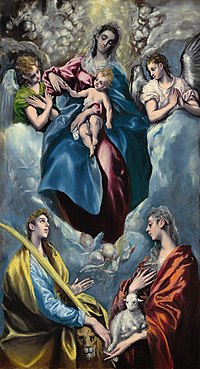| Saint Martina of Rome | |
|---|---|
 Virgin Mary with Saint Agnes and Saint Martina, El Greco. Virgin Mary with Saint Agnes and Saint Martina, El Greco. | |
| Virgin Martyr | |
| Died | 228 Rome |
| Venerated in | Roman Catholic Church Eastern Orthodox Church |
| Major shrine | Santi Luca e Martina |
| Feast | 30 January |
| Attributes | palm of martyrdom |
| Patronage | Rome; nursing mothers |
Martina of Rome, a patron saint of Rome, was martyred in 226, according to some authorities, more probably in 228, under the pontificate of Pope Urban I, according to others. Her feast day is 30 January.
Biography
The daughter of an ex-consul and orphaned at an early age, she was described as a noble and beautiful virgin. She so openly testified to her Christian faith that she could not escape the persecutions under Severus Alexander. Arrested and commanded to return to idolatry, she refused, whereupon she was subjected to various tortures and was finally beheaded.
These tortures according to her vita include being scourged. She was condemned to be devoured by wild beasts in the amphitheater but was miraculously untouched by them. She was then thrown onto a burning pyre, from which she also escaped unhurt, and was finally beheaded. Her hagiography asserts that some of her executioners also converted to Christianity and were themselves beheaded.
Veneration
Ostia, at the mouth of the Tiber, was the scene of her martyrdom; but her body was transported to Rome, where a church near the Mamertine Prison, Santi Luca e Martina, was later dedicated in her honour.
On October 25, 1634, during restoration of the crypt, as was common at this time in Rome, buried remains were found by the painter Pietro da Cortona, president of the Accademia di San Luca, and were attributed to the martyred Saint Martina. No doubt it was hoped that this would precipitate an influx of funds to shelter the relics in a new church. Pope Urban VIII, who occupied the Holy See at that time, had the church repaired and, it would seem, composed the hymns which are sung at her office.

References
- A Western Rite Orthodox Martyrology, p. 8. https://www.stgregoryoc.org/publications/
- Martyrologium Romanum (Libreria Editrice Vaticana 2001 ISBN 978-88-209-7210-3), p. 117
- Gueranger O.S.B., Prosper. The Liturgical Year, Marian House, 1983]
- ^ Clugnet, Léon. "St. Martina." The Catholic Encyclopedia Vol. 9. New York: Robert Appleton Company, 1910. 4 November 2021
 This article incorporates text from this source, which is in the public domain.
This article incorporates text from this source, which is in the public domain.
- Monks of Ramsgate. "Martina". Book of Saints 1921. CatholicSaints.Info. 25 November 2014
 This article incorporates text from this source, which is in the public domain.
This article incorporates text from this source, which is in the public domain.
- Merz, Jörg Martin (2003). ""Saint Martina Refuses to Adore the Idols:" Pietro da Cortona's Painting at Princeton in Context". Record of the Art Museum, Princeton University. 62. Princeton University Art Museum: 84–104. doi:10.2307/3774822. JSTOR 3774822.
- Connors, Joseph (1998). "Pietro da Cortona 1597-1669". Journal of the Society of Architectural Historians. 57 (3). Journal of the Society of Architectural Historians, Vol. 57, No. 3: 318–321. doi:10.2307/991350. JSTOR 991350.
![]() This article incorporates text from a publication now in the public domain: Herbermann, Charles, ed. (1913). "St. Martina". Catholic Encyclopedia. New York: Robert Appleton Company.
This article incorporates text from a publication now in the public domain: Herbermann, Charles, ed. (1913). "St. Martina". Catholic Encyclopedia. New York: Robert Appleton Company.